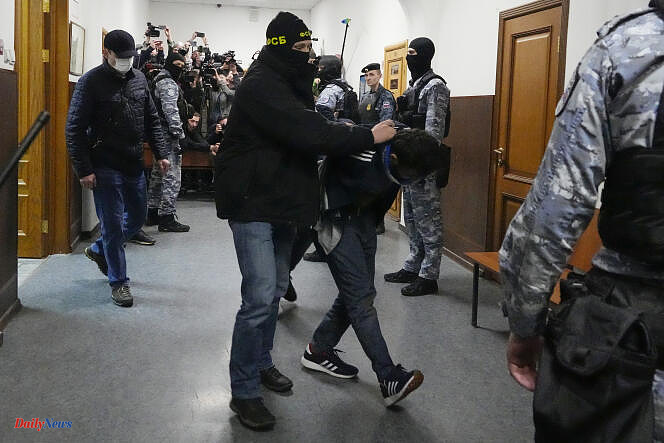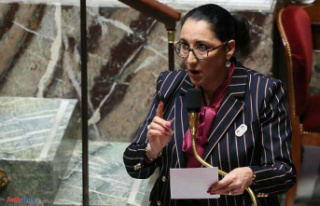The four suspected perpetrators of the attack on a concert hall near Moscow, which left at least 137 dead, were placed in pre-trial detention on Sunday March 24 after their appearance before a court in the capital.
The court played footage showing three suspects being brought into the courtroom handcuffed and doubled over by police officers, then seated in the glass cage reserved for the accused. The fourth arrived in a wheelchair, his eyes closed. One of the suspects had a white bandage on his ear, as in previous videos of the arrest of the alleged attackers released on Saturday by investigators, where three of them appeared with blood on their faces.
They were then placed in pre-trial detention for two months by a court in the Russian capital. The four men are accused of “terrorism” and face life imprisonment, the Basmanny court in Moscow wrote in a statement. Their pre-trial detention, set until May 22, may be extended pending their trial, the date of which has not yet been set. According to the court, two of the accused pleaded guilty. One of them, a native of Tajikistan, “fully admitted his guilt.”
Russian news agency Ria Novosti reported that one of the suspects was a former employee of a hairdresser in Ivanovo, a town northeast of the capital. Another has an eight-month-old child and worked in a parquet factory in Podolsk, Moscow region.
National mourning
No information was provided on the fate of seven other people whose arrest was announced on Saturday and whose role was not specified. The police also announced the discovery at the scene of the attack of 500 cartridges, two Kalashnikovs and twenty-eight magazines, which belonged, according to them, “to the attackers”.
National mourning was observed on Sunday in Russia. Vladimir Putin, who spoke on Saturday, almost twenty-four hours after the events, did not make a new statement but lit a candle in the chapel of his residence in Novo-Ogarevo.
Among the 137 killed in the attack are three children, specifies the Investigative Committee of the Russian Federation in its latest report, communicated on Sunday, while searches continue in the rubble of Crocus City Hall. Health authorities also report 182 injured, of which 101 were still hospitalized as of Sunday evening.
“No Ukrainian involvement” for Washington
If the Islamic State (IS) organization claimed responsibility for the attack on Friday evening, the Russian authorities have still not mentioned the responsibility of the jihadist movement, and have focused on the role they attribute to Ukraine. .
Vladimir Putin assured Saturday that "the four direct perpetrators" of the attack had been arrested while they "tried to flee and headed towards Ukraine", where "a passage" had, according to him, been provided for them to so that they can cross it.
This thesis is rejected by Washington, for which IS bears “sole responsibility for this attack”. “There is no Ukrainian involvement,” said White House National Security Council spokeswoman Adrienne Watson. British Finance Minister Jeremy Hunt also cast doubt on Mr. Putin's version, saying he had "very little confidence" in the word of the Russian authorities.
Ukrainian President Volodymyr Zelensky accused his Russian counterpart of wanting to "shift the blame" onto his country and Polish Prime Minister Donald Tusk said he hoped on Saturday that the attack would not be "a pretext" for an "escalation". of violence” in Ukraine.
A few days before the attack, Mr. Putin saw a “provocation” in American warnings about the risk of an attack in Russia.
The attack on Crocus City Hall is the deadliest attack committed in Russia in twenty years. The Islamic State organization, which Russia is fighting in Syria and which is active in the Russian Caucasus, had already committed smaller attacks there since the end of the 2010s.












